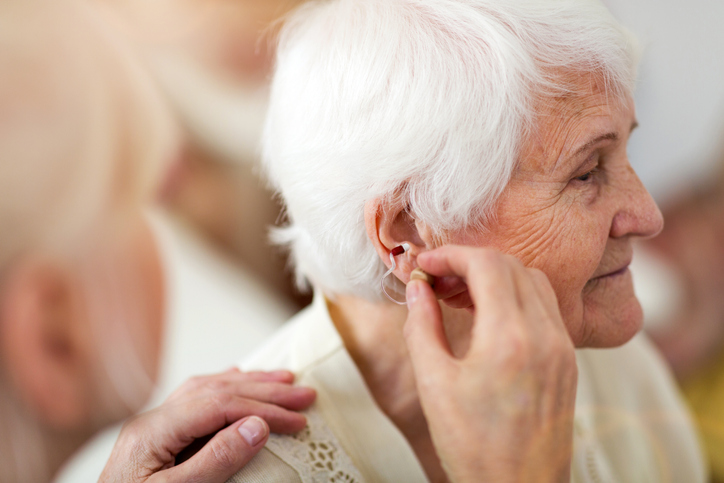
Soon, people may be able to buy hearing aids without needing to go through a hearing exam or fitting. The Food and Drug Administration issued a proposed rule on Tuesday that would allow adults to buy the devices over-the-counter, with the goal of making them more affordable and accessible.
With hearing aids costing an average of $2,500 a pop, the FDA’s announcement was welcome news for the millions of people who experience hearing loss. For manufacturers, though, it drew a mixed response.
Currently, six companies make the majority of hearing aids. One of the largest, Switzerland-based Sonova, hasn’t commented directly on the FDA’s rulemaking, but bought headphone-maker Sennheiser’s consumer division in May. Another consumer electronics company, Bose, released an FDA-cleared, self-fitting hearing aid earlier this year.
Starkey Hearing Technologies, a large U.S.-based manufacturer, has been more vocal with its concerns about the proposed changes.
“We support efforts to increase the accessibility and affordability of hearing aids, but we believe better hearing is best achieved through the hearing professional,” CEO Brandon Sawalich wrote in an emailed statement.
He also shared some specific concerns with the proposed rule, saying the recommended output limits should be reduced to 110 decibels, and that there should be a limit on max gain, or a hearing aid’s amplification.
“We are still analyzing the entirety of the proposed regulations on OTC hearing aids from the FDA, however, in addition to not involving the hearing professional, some initial concerns exist around patient safety and satisfaction,” he wrote.
On the other hand, Audicus, a newer entrant that uses a free online hearing test, was more vocally supportive of the proposed rule. It doesn’t make its own hearing aids, but buys them from manufacturers and resells them at a cheaper price than most hearing clinics.
“We welcome the FDA’s proposed rule to create a class of OTC hearing aids and see it as a milestone towards greater access,” CEO Patrick Freuler wrote in an email. “It will only allow us to further reach those in need of hearing solutions, and deliver life-changing devices to them at a fraction of the cost of traditional channels.”
The specifics
The FDA’s proposed rule would only apply to hearing aids for adults with mild- to moderate- hearing loss. For children, a medical evaluation would still be required before using a hearing aid.
Devices would be limited to a maximum output of 115 decibels, or 120 dB if the device has adjustable volume. The FDA doesn’t plan to limit max gain, saying it would “unduly constrain” the design of devices, and that maximum output levels should be enough for users’ safety.
The agency is also looking at other performance requirements, such as distortion, noise and latency limits.
The idea of over-the-counter hearing aids has been in the works for years. Back in 2015, a report by the President’s Council of Advisors on Science and Technology recommended creating a class of over-the-counter hearing aids, noting that only a fraction of older adults with hearing loss use them. Two years later, Congress passed the Over-the-Counter Hearing Aid Act, creating this class of devices.
The FDA is expected to finalize the rule next year. The Hearing Loss Association of America (HLAA), a consumer advocacy group that supported the legislation, said it expects it will take a year or more for over-the-counter hearing aids to come to market.
“We hope that many adults who qualify for these devices are encouraged to take that important step toward good hearing health,” HLAA Executive Director Barbara Kelley wrote in a news release.
The rule change would effectively remove the requirement that people would need a medical evaluation to buy a hearing aid, and regulate hearing aids for severe hearing loss or for children as prescription devices.
Photo credit: PIKSEL, Getty Images















